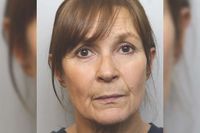A mother who killed her newborn baby boy in 1998 while suffering from severe post-natal depression has been given a two-year suspended prison sentence after a judge determined the case "called for compassion." Joanne Sharkey, now 55, from Liverpool, was identified as the mother of Baby Callum in July 2023 after cold case detectives found a DNA match for her older son, Matthew Sharkey, who had been arrested on suspicion of an unrelated offence.
Baby Callum was found wrapped in two bin bags in woodland in Warrington, Cheshire, on March 14, 1998. Sharkey pleaded guilty to manslaughter on the grounds of diminished responsibility at Liverpool Crown Court, with medical experts concluding that her mental health had "substantially impaired" her ability to form rational judgment when she killed her son.
During the sentencing on April 4, 2025, Judge Mrs. Justice Eady stated, "You had returned to full-time work after maternity leave and seemed to be coping, but that was a façade. You were in fact suffering from post-natal depression. This was not a case of the baby blues but a far more sustained period of depression which impacted on you physically and mentally."
Sharkey's pregnancy in the summer of 1997 came after she had already suffered from undiagnosed post-natal depression following the birth of her first son, Matthew, in 1996. In police interviews, Sharkey described her realization of the pregnancy: "I can't do this again," leading her to try and ignore it. She concealed the pregnancy from her husband, Neil Sharkey, and isolated herself from her family.
On the day of the birth, Sharkey gave birth alone, possibly in the bathroom of their home in Denham Close, Croxteth. The court heard that her memory of the labor was limited due to her mental state, but it was likely that she suffocated Callum by inserting wads of tissue paper into his mouth and throat. Afterward, she drove approximately 35 minutes away to the Callands area of Warrington, near Gulliver's World theme park, where she disposed of his body.
Callum's body was discovered by a dog walker, prompting a large-scale investigation by Cheshire Constabulary. Forensic investigators obtained a DNA profile from blood found on the bin bags but were unable to identify Sharkey as the mother at that time. It wasn't until a fresh check of the national database was ordered by the Major Crimes Review Team in 2023 that a match was found with Matthew Sharkey's DNA, leading to Joanne's identification and arrest.
Upon her arrest, Sharkey immediately informed officers that her husband "doesn't know anything about this." Initially charged with murder, she later accepted a plea of manslaughter based on medical reports. During sentencing, Justice Eady emphasized that experts agreed Sharkey's mental ill-health significantly impaired her ability to make rational decisions.
"There is no evidence of pre-meditation and nothing else can explain your actions other than this abnormality in mental functioning," Justice Eady remarked. She also noted that Sharkey had shown "genuine remorse," stating, "You have not found it easy to articulate, such is your personality, but the evidence is clear, not a day has passed when you have not dwelt on these matters appreciating the horrendous nature of your crime."
As part of her sentence, Sharkey was ordered to undergo mental health treatment and complete a rehabilitation activity requirement. The judge concluded that while Sharkey's actions were tragic, immediate imprisonment would not serve a useful purpose. Instead, she expressed that appropriate punishment could be achieved through a suspended sentence.
Following the sentencing, Detective Inspector Hannah Friend of Cheshire Constabulary remarked, "The case of Baby Callum has stayed with the local community for 27 years; he has never been forgotten, and his memory has lived on in the area ever since. Our efforts to locate who cut his innocent life short have never wavered over the years."
Sharkey's case has sparked discussions about the importance of mental health support for new mothers, particularly in light of the severe post-natal depression she suffered. As the community reflects on this long-standing tragedy, many hope that the case will highlight the need for better mental health resources and support systems for those facing similar challenges.









